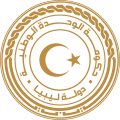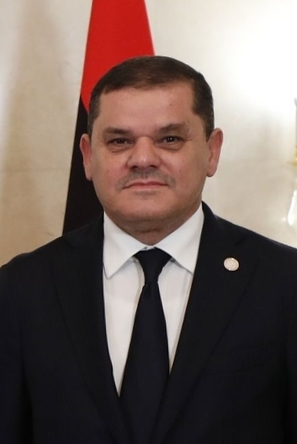Minister of Foreign Affairs (Libya) facts for kids
Quick facts for kids Minister of Foreign Affairs |
|
|---|---|
 |
|
| Ministry of Foreign Affairs | |
| Style | Mr. Minister (currently) Miss. Minister (Not at the moment) |
| Member of | Cabinet of Libya |
| Reports to | Prime Minister |
| Seat | Tripoli, Libya |
| Term length | No fixed term At the Prime Minister's behest |
| Formation | 29 March 1951 |
| First holder | Ali Jerbi |
| Website | www.foreign.gov.ly |
This article lists the people who have served as the top diplomat for Libya. These important leaders are known as foreign ministers. They help Libya connect with other countries around the world.
What Does a Foreign Minister Do?
A foreign minister is like a country's main spokesperson to the rest of the world. Their job is to manage how their country talks to other nations. This includes making friends, solving problems, and working together on global issues.
They represent their country in international meetings. They also help create treaties and agreements. The exact name for this role can change depending on the government in power. For example, in Libya's past, the title was "Secretary of People's Committee for Foreign Communication."
Libya's Foreign Ministers Through History
Libya has had many foreign ministers since it became an independent country. Each minister played a part in shaping Libya's relationships with other nations. Here is a list of these important individuals.
Early Foreign Ministers: Before Independence
Before Libya became fully independent, a provisional (temporary) government was set up. This government also had a foreign minister to handle early international relations.
| Portrait | Name | Lifespan | Term of office | Prime Minister |
|---|---|---|---|---|
 |
Ali Jerbi | 1903–1969 | 29 March 1951 – 24 December 1951 | Mahmud al-Muntasir |
Libya's Kingdom Era: 1951-1969
After gaining independence, Libya became a kingdom. During this time, several individuals served as foreign minister. They helped establish Libya's place on the world stage.
| Portrait | Name | Lifespan | Term of office | Prime Minister |
|---|---|---|---|---|
 |
Mahmud al-Muntasir | 1903–1970 | 24 December 1951 – 19 February 1954 | Mahmud al-Muntasir |
 |
Muhammad Sakizli | 1892–1976 | 19 February 1951 – 11 April 1954 | Muhammad Sakizli |
| Abdul Salam al-Buseiri | 1898–? | 11 April 1954 – 3 December 1954 | Mustafa Ben Halim | |
 |
Mustafa Ben Halim | 1921– 2021 | 3 December 1954 – 30 October 1956 | |
| Ali Sahli | 1924–2004 | 30 October 1956 – 14 March 1957 | ||
 |
Abdul Majid Kubar (1st time) |
1909–1988 | 14 March 1957 – 26 May 1957 | |
| Wahbi al-Bouri (1st time) |
1916–2010 | 26 May 1956 – 11 October 1958 | Abdul Majid Kubar | |
 |
Abdul Majid Kubar (2nd time) |
1909–1988 | 11 October 1958 – 16 October 1960 | |
 |
Abdul Qadir al-Allam | 1919–2003 | 16 October 1960 – 3 May 1961 | Muhammad Osman Said |
| Suleiman Jerbi | ? | 3 May 1961 – 27 January 1962 | ||
 |
Wanis al-Qaddafi (1st time) |
1924–1986 | 27 January 1962 – 6 March 1963 | |
| Omar Mahmud al-Muntasir | 1930–1999 | 6 March 1963 – 19 March 1963 | Muhammad Osman Said | |
 |
Mohieddin Fikini | 1925–1994 | 19 March 1963 – 22 January 1964 | Mohieddin Fikini |
 |
Hussein Maziq | 1918–2006 | 22 January 1964 – 20 March 1965 | Mahmud al-Muntasir |
| Wahbi al-Bouri (2nd time) |
1916–2010 | 20 March 1965 – 2 October 1965 | Hussein Maziq | |
 |
Ahmad Bishti | born 1927 | 2 October 1965 – 4 January 1968 | Hussein Maziq (1965–1967) Abdul Qadir al-Badri (1967) Abdul Hamid al-Bakkoush (1967–1968) |
 |
Wanis al-Qaddafi (2nd time) |
1924–1986 | 4 January 1968 – 4 September 1968 | Abdul Hamid al-Bakkoush |
 |
Shams ad-Din Orabi | died 2009 | 4 September 1968 – June 1969 | Wanis al-Qaddafi |
| Ali Hassanein | 1925–2018 | June 1969 – 31 August 1969 |
Libya Under Gaddafi: 1969-2011
After a change in government in 1969, Libya entered a new political period. The role of foreign minister continued to be very important. The title for this role also changed during this time.
Libyan Arab Republic: 1969-1977
This period saw Libya as a republic. Foreign ministers worked to build relationships with other countries under this new system.
| Portrait | Name | Lifespan | Term of office | Prime Minister |
|---|---|---|---|---|
 |
Salah Busir | 1925–1973 | 1969–1970 | Mahmud Suleiman Maghribi |
 |
Mohammed Najm | 1943–2016 | 1970–1972 | Muammar Gaddafi |
| Mansour Rashid El-Kikhia | 1931–c. 1993 | 1972–1973 | Abdessalam Jalloud | |
| Abdul Monem el Houni | ? | 1974–1975 | ||
 |
Ali Treki (1st time) |
1938–2015 | 1976–1977 |
Libyan Arab Jamahiriya: 1977-2011
During the Jamahiriya era, the foreign minister was called the "Secretary of the People's Committee for External Communication." This title showed the unique way Libya was governed.
| Portrait | Name | Lifespan | Term of office | Secretary of General People's Committee |
|---|---|---|---|---|
| Secretaries of the People's Committee for External Communication | ||||
 |
Ali Treki | 1938–2015 | 1977–1982 | Abdul Ati al-Obeidi (1977–1979) Jadallah Azzuz at-Talhi (1979–1982) |
 |
Abdul Ati al-Obeidi (1st time) |
1939–2023 | 1982–1984 | Jadallah Azzuz at-Talhi |
 |
Ali Treki (2nd time) |
1938–2015 | 1984–1986 | Muhammad az-Zaruq Rajab |
| Kamel Maghur | 1935–2002 | 1986–1987 | Jadallah Azzuz at-Talhi | |
| Jadallah Azzuz at-Talhi | 1939–2024 | 1987–1990 | Umar Mustafa al-Muntasir | |
| Ibrahim al Bishari | c. 1942–1997 | 1990–1992 | Abuzed Omar Dorda | |
| Umar Mustafa al-Muntasir | 1939–2001 | 1992–2000 | Abuzed Omar Dorda (1992–1994) Abdul Majid al-Qa′ud (1994–1997) Muhammad Ahmad al-Mangoush (1997–2000) |
|
| Abdel Rahman Shalgham | born 1949 | 2000–2009 | Imbarek Shamekh (2000–2003) Shukri Ghanem (2003–2006) Baghdadi Mahmudi (2006–2009) |
|
 |
Moussa Koussa | born 1950 | 2009–2011 | Baghdadi Mahmudi |
 |
Abdul Ati al-Obeidi (2nd time) |
1939–2023 | 2011 | |
Transitional Period: 2011-2021
After 2011, Libya went through a period of big changes. During this time, different governments worked to bring stability. Foreign ministers played a key role in these efforts.
| Portrait | Name | Lifespan | Term of office | Prime Minister |
|---|---|---|---|---|
 |
Mahmoud Jibril | 1952–2020 | 23 March 2011 – 23 November 2011 | Mahmoud Jibril |
 |
Ashour Bin Khayal | born 1939 | 24 November 2011 – 14 November 2012 | Abdurrahim El-Keib |
 |
Mohamed Abdelaziz | born c. 1952 | 14 November 2012 – 28 September 2014 | Ali Zeidan (2012–2014) Abdullah al-Thani (2014) |
 |
Mohammed al-Dairi | born 1952 | 28 September 2014 – 28 February 2019 | Abdullah al-Thani |
| Abdulhadi Elhweg | born 1971 | 28 February 2019 – 15 March 2021 | Abdullah al-Thani |
Government of National Accord: 2016-2021
The Government of National Accord was formed to unite different groups in Libya. Its foreign minister worked to represent Libya internationally during this period.
| Portrait | Name | Lifespan | Term of office | Prime Minister |
|---|---|---|---|---|
 |
Mohamed Taha Siala | born 1943 | 30 March 2016 – 15 March 2021 | Fayez al-Sarraj |
Government of National Unity: 2021-Present
The Government of National Unity was created to bring stability and prepare for elections. Its foreign ministers continue to work on Libya's international relationships.
| Portrait | Name | Lifespan | Term of office | Prime Minister |
|---|---|---|---|---|
 |
Najla Mangoush | born 1970 | 15 March 2021 – 28 August 2023 (Suspended) | Abdul Hamid Dbeibeh |
| Fathallah al-Zani (Acting) | born 1985 | 28 August 2023 – 3 September 2023 | ||
 |
Abdul Hamid Dbeibeh (Acting) | born 1958 | 3 September 2023 – Present |
 | Madam C. J. Walker |
 | Janet Emerson Bashen |
 | Annie Turnbo Malone |
 | Maggie L. Walker |


